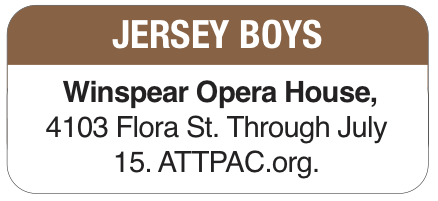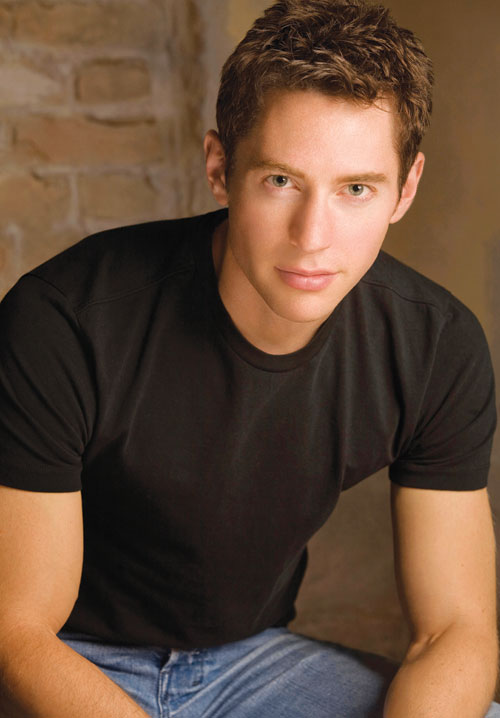Hetero musical ‘Jersey Boys’ get a dash of gay from hunky Barry Anderson
One of the surprising facts you learn from Jersey Boys — the mega-hit musical about the founding of ‘60s rock group The Four Seasons — is that the songs that helped define romantic melodies for scores of straight folks were co-written by a gay man.
Bob Crewe, lyricist and producer for the band, is played in the national tour (settling in at the Winspear for a month-long run) by actor, budding songwriter and fellow member of the gay community Barry Anderson. Anderson spoke about touring as the iconic musicmaker.
Dallas Voice: The tour of Jersey Boys will set you up in Dallas for more than a month. Do you enjoy touring? Barry Anderson: This is my third tour. I did a bus and truck of My Fair Lady about 10 years ago, and we played some towns for one night only. In 2009 I did Legally Blonde for 18 months [after being in the Broadway production]. Two years of Legally Blonde is a lot of pink. We brought it to Dallas, so I’ve experienced the spectrum. I appreciate so much more the longer stints. On this tour we’re playing great cities. There’s so much to do. Over five weeks, we get four Mondays off to explore and see some of the fun things to do. I do enjoy touring because we get to bring the show to a part of the country to see how certain things play in certain regions. Audiences gravitate toward different things. You sacrifice being away from home and that stability, but it’s a great opportunity to travel while working.
I think one of the things that has helped make Jersey Boys such a hit is that it’s a musical that hetero men can enjoy. Yes, Jersey Boys is certainly a show straight guys don’t mind going to see. Overwhelmingly, people leave having been educated so much. I always hear, ‘I never knew that about that group.’ They know only the songs. It’s usually a blank slate — a Behind the Music kind of show and a really good biography. What’s been fun for us is, all the characters existed. It made researching it all very doable. Several days of rehearsal were just doing dramaturgy — about the band, and Italian-American culture. It was like jumping back to a college course in a way.
Did you have any direct contact with Bob Crewe, who you play? I have not, and only because we’ve gotten word he’s in declining health. He doesn’t travel much anymore.
 I’ve heard that the show downplays his role in the group. But Crewe is even credited as the sole lyricist of the entire show. Without a doubt he was instrumental in creating the sound that became their signature. He was writing specifically for them, and was definitely in the studio and had a direct hand co-writing the songs with Bob Gaudio. Perhaps if the show were four hours long we could delve more into his story. But in our play, he provides a lot of laugh lines, which for me is a blast. And you do get a sense for his talent behind the scenes.
I’ve heard that the show downplays his role in the group. But Crewe is even credited as the sole lyricist of the entire show. Without a doubt he was instrumental in creating the sound that became their signature. He was writing specifically for them, and was definitely in the studio and had a direct hand co-writing the songs with Bob Gaudio. Perhaps if the show were four hours long we could delve more into his story. But in our play, he provides a lot of laugh lines, which for me is a blast. And you do get a sense for his talent behind the scenes.
Bob Crewe has been described as devastatingly handsome — obviously you were typecast — but also had a unique career. He had such a varied career. He recorded as a soloist early on, he studied design, he was a fashion model. It sets him apart in his mannerism and his own aura — he was always described as very refined whereas the other guys were a little rough around the edges. He was stylish and a bit on the eccentric side. It’s just a blast to have fun with all that and be different. You feel like you’re watching a movie.
In the play, they call him “flamboyant” which we all know is code for gay. Ha! Yes. In the show, Bob Gaudio’s character addresses the audience and says, “This is the ’60s — people just thought Liberace was theatrical.” Back then, people knew but didn’t talk about it. I think that’s another thing people don’t think about [the Four Seasons}: This flamboyant gay man was creating all of the songs that working class straight guys were playing on the radio all that time. It’s another interesting factoid. Everyone that kind of knew him said he had no apologies about his sexuality. He has to this day been very vocal in support of the gay community. I like to give that to the audience. But at the same time, I think by the end of the play it’s not even an issue.
I think it’s funny that a lot of songs sung at sporting events — like “We Are the Champions” — were written by gay men. Yes, well, those big anthems are all pretty dramatic, so it kind of makes sense.
This article appeared in the Dallas Voice print edition June 15, 2012.
















